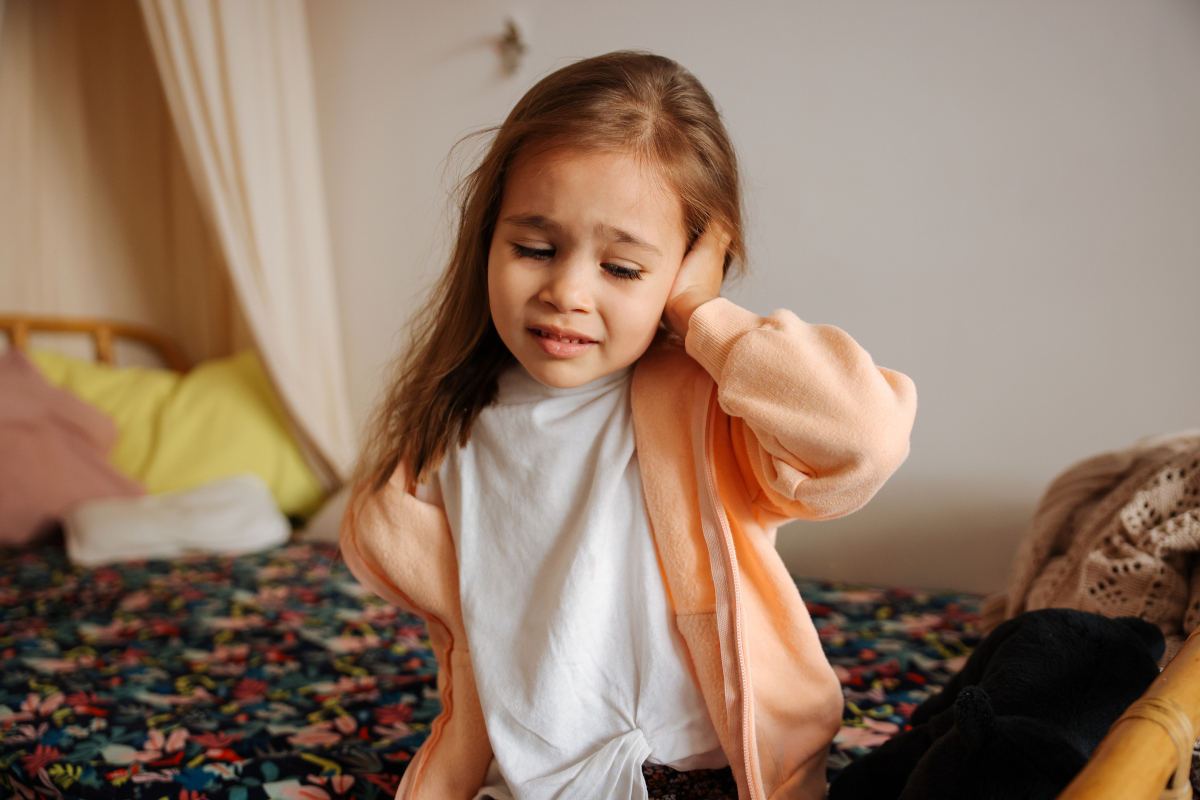Earache With COVID-19: Symptoms and Treatments
:max_bytes(150000):strip_icc()/GettyImages-1278802536-22063dc551314044bbee66bc0910705b.jpg)
COVID-19 can cause an earache, with effects that include ear pain, hearing loss, or dizziness. Symptoms of an ear infection with the virus that causes COVID can be similar to those of an ear infection caused by other viruses and bacteria.
Long COVID can cause ear symptoms as well. Hearing loss and a ringing in the ears may show up after the infection has resolved. You could still get long COVID symptoms affecting your ear even if you didn’t have any other symptoms of COVID-19.
This article explains how COVID-19 can cause an ear infection, what effects long COVID can have on the ears, and other causes of ear pain. Also, find out how to treat ear pain and discomfort caused by COVID and when to see a healthcare provider for your symptoms.
Illustration by Jessica Olah for Verywell Health
How COVID Affects Ears
Respiratory symptoms, like cough and labored breathing, may be the best-known symptoms of COVID, but they are not the only ones. COVID can cause a number of ear symptoms as well:
- Vertigo/dizziness: Vertigo is a commonly reported ear symptom of COVID. If you have vertigo, you may feel unstable standing or walking or feel like the room is spinning. These ear symptoms may become more intense when you change body positions.
- Hearing loss: Loss of hearing has been reported as a symptom of COVID, sometimes as the only symptom.
- Tinnitus: Some people with COVID have reported tinnitus, or a ringing in the ears.
- Pain: There have also been cases of otalgia, the medical term for earache. Pain may occur around the ear or in the ear canal.
- Sensation of fullness: Fullness in the ears is a classic symptom of eustachian tube dysfunction. The eustachian tubes are passages that connect the back of your nose to your middle ear. They can become blocked because of an upper respiratory viral infection, like COVID. The sensation of fullness may be occasional or come and go, but sometimes it’s continuous. In most cases, it’s tolerable.

Can COVID Cause an Ear Infection?
SARS-CoV-2, the virus that causes COVID, can cause ear infections. It can infect the inner ear as well as the middle ear. The inner ear is responsible for your sense of balance and hearing. Viral infections of the inner ear can cause balance and hearing problems in some people with COVID.
When the virus infects the middle ear, it can cause otitis media with effusion. This condition occurs when fluid builds up in the middle ear. This backed-up fluid provides an ideal environment for viruses or bacteria to multiply. With a middle ear infection, you may have mild to moderate hearing loss, cracking sounds when you swallow, and fullness in the ear.
Hearing and/or balance problems appear to occur equally regardless of the variant of the virus you get infected with. In a 2022 study, the alpha/beta, delta, and omicron variants of SARS-CoV-2 were equally likely to cause ear problems like fullness, hearing loss, tinnitus, and dizziness.
Ear Infection Causes
SARS-CoV-2 is not the only infectious agent that can cause an ear infection. Other viruses and bacteria can infect the ear as well. The illness may start out as a seemingly benign cold or a respiratory infection.
While ear infections are more common in children, adults can get them too. A cold or allergy can cause inflammation and swelling of the eustachian tube. When this happens, fluid builds up behind the eardrum. Viruses and bacteria can multiply in this fluid, causing an infection of the middle ear.
COVID-19 Doctor Discussion Guide
:max_bytes(150000):strip_icc()/DoctorDiscussionGuideOldMan-5c3e5dd446e0fb00017d6d47.png)
Risk Factors for an Earache With COVID
Smoking, year-round or seasonal allergies, and a cold or respiratory infection can increase your risk of getting an ear infection.
Earache can occur more often in children because of their smaller eustachian tubes, but many of these symptoms overlap. If you or your child are experiencing symptoms that you think could be either COVID or an ear infection, talk to your healthcare provider for a proper diagnosis.
Long COVID and Ear Problems
Long COVID refers to any medical condition that lasts for four weeks or more after the initial SARS-CoV-2 infection has resolved. Post-acute symptoms may last for three to 12 weeks, while chronic symptoms can last 12 weeks or more. COVID tests won’t likely show that you have COVID even though you may still be having long-lasting symptoms related to the virus.
The following ear symptoms may be a sign of long COVID:
- Hearing loss
- Tinnitus
- Vertigo/dizziness
Other COVID Symptoms
Ear problems aren’t the typical symptoms you would expect if you think you have COVID. More commonly, you may have one or more of the following symptoms:
Other Causes of Ear Pain
You may not have COVID, but could still have ear pain. Ear pain can be caused by more conditions than an ear infection, including those listed below:

When to See a Healthcare Provider
Given how variable both COVID-19 and ear infections can be, you shouldn’t try to self-diagnose. Both COVID-19 and an ear infection can cause similar symptoms like fever and headaches.
If you think you have COVID or an ear infection, see a healthcare provider or an ear, nose, and throat (ENT) specialist to get tested.
COVID-19 Diagnosis
COVID testing entails collecting a specimen from your nose or mouth. The sample will then be tested in a PCR test or an antigen test, which both look for an active infection.
Get immediate medical treatment if you or someone else has these serious signs of COVID-19:
- Trouble breathing
- Persistent pain or pressure in the chest
- New confusion
- Inability to wake or stay awake
- Pale, gray, or blue-colored skin, lips, or nail beds, depending on skin tone
Ear Infection Diagnosis
Healthcare providers will examine your ear with an instrument called an otoscope. As they are testing your ear, they will assess whether it’s a healthy eardrum, which will be pinkish grey and clear, or one that has an infection. An infected eardrum might look reddish in color, swollen, and puffy with inflammation.
A pneumatic otoscope is a device that blows air into the eardrum, causing it to move back and forth. This is to assess if the fluid retention is in the middle ear. The eardrum won’t move back and forth with ease if fluid has built up.
Tympanometry may also be employed. It is a test that uses air pressure to check for fluid retention in the middle ear.
See a healthcare provider if you have chronic (recurrent) ear infections, fluid that refuses to drain away, or symptoms that aren’t improving after two or three days.
Ear Infections Doctor Discussion Guide
:max_bytes(150000):strip_icc()/DoctorDiscussionGuideChild-5c3e5dce46e0fb0001881390.png)
Can You Treat COVID Ear Problems?
COVID ear symptoms may go away on their own as your body works on getting rid of the virus. Long COVID, however, can cause symptoms to last for weeks, months, or even years after you recover.
See a healthcare provider or ENT specialist to get specific treatment for your ear symptoms. Some forms of hearing loss can be treated, such as with a steroid administered to the eardrum. Other forms of hearing loss are permanent and may not improve.
Tinnitus resulting from a buildup of fluid or earwax should be reduced when the blockage is removed. Otherwise sound therapies and behavioral therapies can help reduce the symptoms of tinnitus. There is no medication that specifically treats tinnitus.
Treating an ear infection may involve antivirals or antibiotics depending on the cause. Decongestants, antihistamines, or nasal steroids may be in order to help clear blockage. Pain medication can be used to alleviate discomfort.
Chronic ear infections that recur often or that present consistent fluid buildup in the middle ear may require treatment with ear tubes, which are small cylinders that are positioned through the eardrum to allow easy passage of air into the middle ear. They are inserted during an outpatient surgical procedure known as a myringotomy.
Summary
COVID-19 can lead to ear infections, causing symptoms like hearing loss, ringing in the ears, and fullness. It can also cause ear pain and dizziness. Sometimes ear symptoms go away on their own. In other cases, they may linger as a result of long COVID.
If you find yourself experiencing symptoms of either COVID-19 or an ear infection, consult your healthcare provider right away. It is important that you be tested for COVID-19 to prevent the spread of the virus.
An ear infection that doesn’t go away on its own and is left untreated can result in pain and hearing problems. If your symptoms become more extreme, seek medical attention right away.
The information in this article is current as of the date listed, which means newer information may be available when you read this. For the most recent updates on COVID-19, visit our coronavirus news page.
link

:max_bytes(150000):strip_icc()/asian-sick-little-girl-lying-in-bed-with-a-high-fever-952683074-5b5b784046e0fb005027ca13.jpg)



